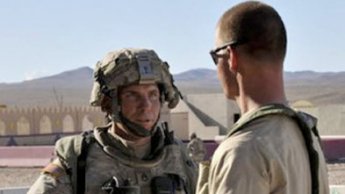www.aljazeerah.info
News, May 2013
Archives
Mission & Name
Conflict Terminology
Editorials
Gaza Holocaust
Gulf War
Isdood
Islam
News
News Photos
Opinion Editorials
US Foreign Policy (Dr. El-Najjar's Articles)
www.aljazeerah.info
|
Editorial Note: The following news reports are summaries from original sources. They may also include corrections of Arabic names and political terminology. Comments are in parentheses. |
US soldier will plead guilty in Afghan village massacre

A US soldier charged with killing 16 Afghan villagers in a brutal March 2012 massacre will plead guilty in order to avoid the death penalty. Robert Bales (pictured left) was “crazed” during the attack, his lawyers said on Wednesday.
The U.S. Army staff sergeant charged with killing 16 villagers in one of the worst atrocities of the Afghanistan war will plead guilty to avoid the death penalty in a deal that requires him to recount the horrific attack for the first time, his attorney told The Associated Press.
Robert Bales was “crazed” and “broken” when he slipped away from his southern Afghanistan outpost in March 2012 and attacked mud-walled compounds in two sleeping villages nearby, lawyer John Henry Browne said Wednesday. But his client’s mental state didn’t rise to the level of a legal insanity defense, Browne said.
The Army had been trying to have Bales executed, and Afghan villagers have demanded it. In interviews with the AP last month, relatives of the victims became outraged at the notion Bales might escape the death penalty.
“For this one thing, we would kill 100 American soldiers,” vowed Mohammed Wazir, who had 11 family members killed that night, including his mother and 2-year-old daughter. Most of the victims were women and children, and some of the bodies were piled and burned.
The killings drew such angry protests that the U.S. temporarily halted combat operations in Afghanistan. It was three weeks before U.S. investigators could reach the crime scenes.
Any plea deal must be approved by the judge as well as the commanding general at the U.S. base where Bales is being held. A plea hearing is set for June 5, said Lt. Col. Gary Dangerfield, an Army spokesman. He said he could not immediately provide other details.
“The judge will be asking questions of Sgt. Bales about what he did, what he remembers and his state of mind,” said Browne, who told the AP the commanding general has already approved the deal. A sentencing-phase trial is set for September.
Browne previously indicated Bales remembered little from the night of the massacre. But as further details and records emerged, Bales began to remember what he did, the lawyer said, and he will admit to “very specific facts” about the shootings.
Browne would not elaborate on what his client will tell the judge.
Bales had been drinking contraband alcohol and snorting Valium that was provided to him by another soldier and had been taking steroids before the attack.
Testimony at a hearing last year established that Bales returned to his base between attacking the two villages, woke up a fellow soldier and confessed. The soldier didn’t believe him and went back to sleep, and Bales left again to continue the slaughter.
Browne said his client, who was on his fourth combat deployment, was suffering from post-traumatic stress disorder and a traumatic brain injury. He continued to blame the Army for sending him back to war in the first place.
“He’s broken, and we broke him,” Browne said.
The massacre raised questions about the toll multiple deployments were taking on U.S. troops. For that reason, many legal experts believed it that it was unlikely that he would receive the death penalty. The military justice system hasn’t executed anyone since 1961.
The defense team, including military lawyers assigned to Bales, eventually determined after having him examined by psychiatrists that he would not be able to prove any claim of insanity or diminished capacity at the time of the attack, Browne said.
Browne acknowledged the plea deal could inflame tensions in Afghanistan and said he was disappointed the case has not done more to focus public opinion on the war.
“It’s a very delicate situation. I am concerned there could be a backlash,” he said. “My personal goal is to save Bob from the death penalty. Getting the public to pay more attention to the war is secondary to what I have to do.”
(AP)
Fair Use Notice
This site contains copyrighted material the
use of which has not always been specifically authorized by the copyright
owner. We are making such material available in our efforts to advance
understanding of environmental, political, human rights, economic,
democracy, scientific, and social justice issues, etc. We believe this
constitutes a 'fair use' of any such copyrighted material as provided for
in section 107 of the US Copyright Law. In accordance with Title 17 U.S.C.
Section 107, the material on this site is
distributed without profit to those
who have expressed a prior interest in receiving the included information
for research and educational purposes. For more information go to: http://www.law.cornell.edu/uscode/17/107.shtml.
If you wish to use copyrighted material from this site for purposes of
your own that go beyond 'fair use', you must obtain permission from the
copyright owner.
|
|
|
|
||
|
||||||


